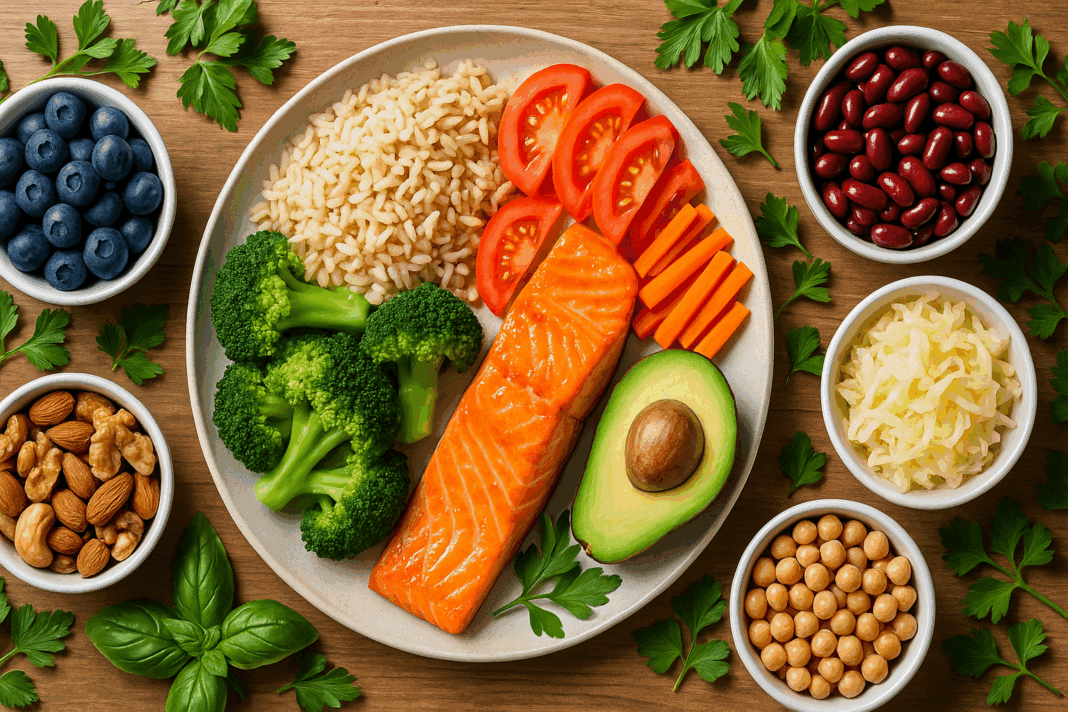In a world flooded with fad diets and wellness trends, it’s easy to lose sight of what truly supports long-term health. But beneath the noise, one truth remains constant: the best nutrition for health is grounded in science, not hype. As emerging research deepens our understanding of the connection between food and overall well-being, we’re discovering that what we eat isn’t just fuel—it’s medicine, prevention, and in many ways, a daily investment in our future selves. For anyone looking to elevate their vitality, improve metabolic function, and reduce the risk of chronic disease, focusing on food for health is one of the most effective, empowering steps you can take.
You may also like: Best Foods for Cognitive Function: What Science Reveals About Brain Nourishment, Focus, and Mental Clarity
Modern nutritional science highlights specific foods and dietary patterns that actively support physical and mental well-being. These foods go beyond simply filling you up; they help optimize biological pathways, modulate inflammation, and fine-tune hormonal and cognitive function. By understanding which foods offer the best nutrition for health, individuals can make informed decisions that align with both evidence-based recommendations and personal preferences.
Let’s take a comprehensive look at the scientifically proven foods that enhance wellness across multiple domains—from cardiovascular and cognitive health to immune resilience and emotional balance.
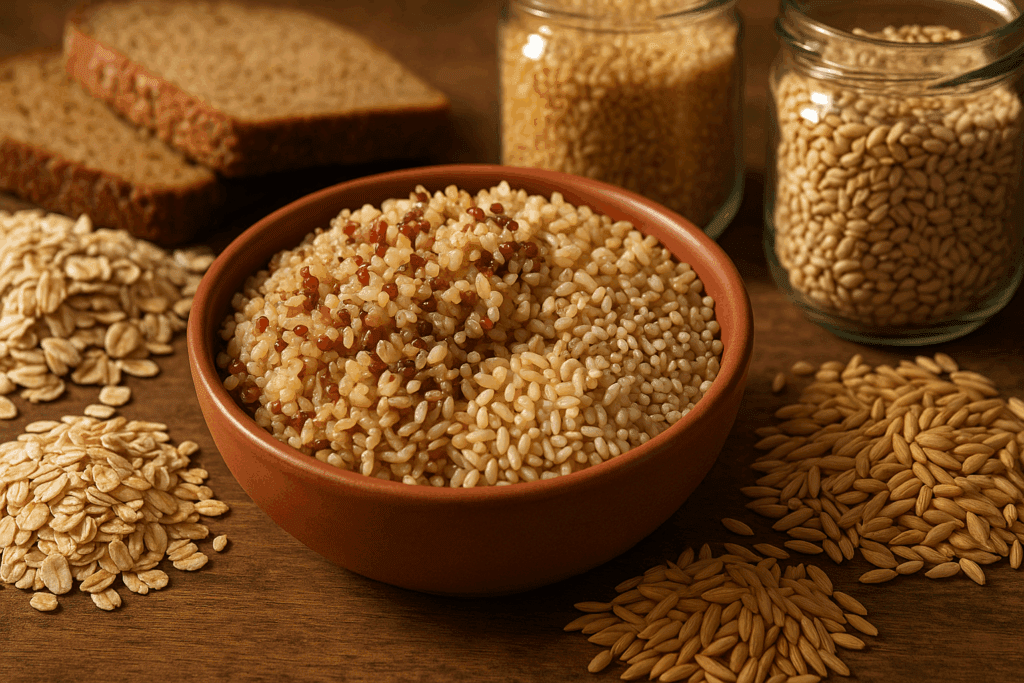
Whole Grains and Their Role in Disease Prevention
Whole grains are more than a complex carbohydrate source; they are a cornerstone of dietary health that provides a unique synergy of fiber, vitamins, minerals, and phytonutrients. Unlike refined grains, which are stripped of valuable nutrients during processing, whole grains retain the bran, germ, and endosperm—components that are rich in essential compounds like magnesium, B vitamins, and antioxidants such as ferulic acid and lignans.
Research consistently associates whole grain consumption with a reduced risk of heart disease, type 2 diabetes, and certain forms of cancer. For instance, a study published in The Lancet in 2019 found that increased intake of whole grains was among the most protective dietary factors against all-cause mortality. These protective effects stem largely from whole grains’ ability to improve insulin sensitivity, reduce systemic inflammation, and promote a healthier lipid profile. Foods such as oats, quinoa, bulgur, barley, and brown rice deliver these benefits when eaten regularly and as part of a balanced diet.
Beyond metabolic health, whole grains also play a role in supporting gut microbiota diversity. The prebiotic fibers in whole grains feed beneficial bacteria in the colon, helping to create short-chain fatty acids that contribute to colon health and systemic immune balance. The integration of whole grains into one’s eating pattern exemplifies food for health in its most foundational form, offering a sustainable way to nourish both the body and the microbial community that supports it.
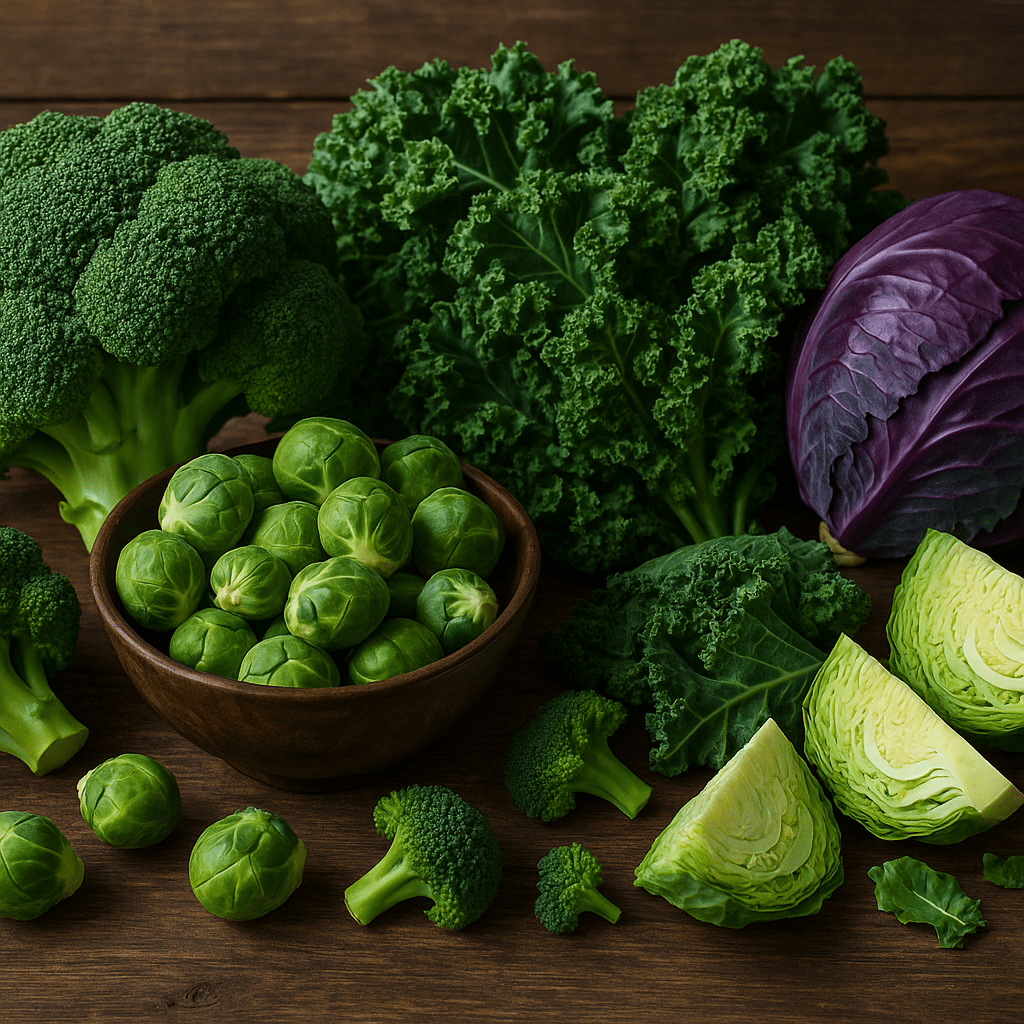
Cruciferous Vegetables: Detoxification and Hormonal Balance
Cruciferous vegetables such as broccoli, Brussels sprouts, cabbage, and kale stand out among plant foods for their potent phytochemical composition. Rich in glucosinolates, these vegetables produce biologically active compounds like sulforaphane and indole-3-carbinol when chopped or chewed. These compounds have been extensively studied for their chemoprotective effects, particularly in hormone-related cancers such as breast and prostate cancer.
Sulforaphane, in particular, has been shown to activate phase II detoxification enzymes in the liver, enhancing the body’s ability to neutralize potentially carcinogenic substances. At the same time, compounds in cruciferous vegetables can help regulate estrogen metabolism in a favorable direction, supporting hormonal balance for both women and men. The antioxidant and anti-inflammatory properties of these vegetables also contribute to their cardiovascular and neurological protective effects.
Importantly, the benefits of cruciferous vegetables extend to cognitive and mental health. Sulforaphane has demonstrated neuroprotective properties in preclinical models of Alzheimer’s disease and depression, making it a compelling candidate for dietary strategies that support brain resilience. Including at least one to two servings of these vegetables daily is a realistic and impactful step toward achieving the best nutrition for health.

Fatty Fish and Omega-3s for Brain and Heart Vitality
Among all animal-based foods, fatty fish such as salmon, sardines, mackerel, and herring are uniquely rich in omega-3 fatty acids—specifically EPA (eicosapentaenoic acid) and DHA (docosahexaenoic acid). These essential fats are vital components of cellular membranes and have far-reaching effects on inflammation, cognition, and cardiovascular health.
Clinical trials and meta-analyses have confirmed that regular consumption of omega-3-rich fish lowers triglyceride levels, stabilizes heart rhythm, and reduces blood pressure. DHA plays a structural role in brain tissue, while EPA contributes to mood regulation and inflammation modulation. This makes fatty fish a cornerstone food for health, especially in reducing the risk of heart disease, cognitive decline, and mood disorders like depression.
Furthermore, omega-3 fatty acids appear to influence gene expression related to metabolic regulation. For example, they can upregulate genes involved in fatty acid oxidation while downregulating those associated with fat storage and inflammation. This makes them particularly beneficial for individuals with insulin resistance or metabolic syndrome. Aim for two to three servings of fatty fish weekly to ensure a consistent intake of these critical nutrients.

Berries and Polyphenols for Antioxidant Defense
Berries—especially blueberries, strawberries, raspberries, and blackberries—are among the most nutrient-dense fruits available. Their deep pigments are a reflection of their high polyphenol content, including anthocyanins, flavonols, and ellagic acid. These compounds offer robust antioxidant and anti-inflammatory effects, making berries a superior choice in the pursuit of best nutrition for health.
Polyphenols in berries protect endothelial cells, enhance nitric oxide production, and reduce oxidative stress in arteries. This translates to improved blood vessel function and lower blood pressure. Moreover, berries have been linked to improved cognitive performance, with studies showing delayed memory decline in older adults who consume them regularly. The connection between polyphenols and brain health is increasingly recognized in the scientific literature.
In addition to their cardiovascular and cognitive benefits, berries support metabolic regulation. Their low glycemic index and high fiber content help stabilize blood sugar levels, making them suitable even for individuals managing insulin resistance or type 2 diabetes. Including a daily serving of mixed berries can be a simple yet effective habit for anyone prioritizing food for health.
Legumes and Plant Proteins for Longevity
Legumes—including lentils, chickpeas, black beans, and kidney beans—are powerful allies in disease prevention and health maintenance. They provide an exceptional combination of plant-based protein, soluble fiber, iron, magnesium, and folate. Their low cost and versatility also make them accessible components of health-promoting diets across the globe.
Epidemiological data from populations known for their longevity, such as those in the Blue Zones, consistently show high legume consumption as a common dietary trait. This association is not coincidental. Legumes improve lipid profiles, enhance glycemic control, and promote satiety—factors that collectively contribute to reduced risk of obesity, cardiovascular disease, and type 2 diabetes.
Moreover, the fermentable fiber in legumes supports gut health by stimulating the growth of beneficial bacteria and increasing the production of short-chain fatty acids. These byproducts help regulate immune function and may even influence mood and cognition through the gut-brain axis. In this way, legumes exemplify how the best nutrition for health extends beyond individual nutrients to encompass holistic physiological effects.
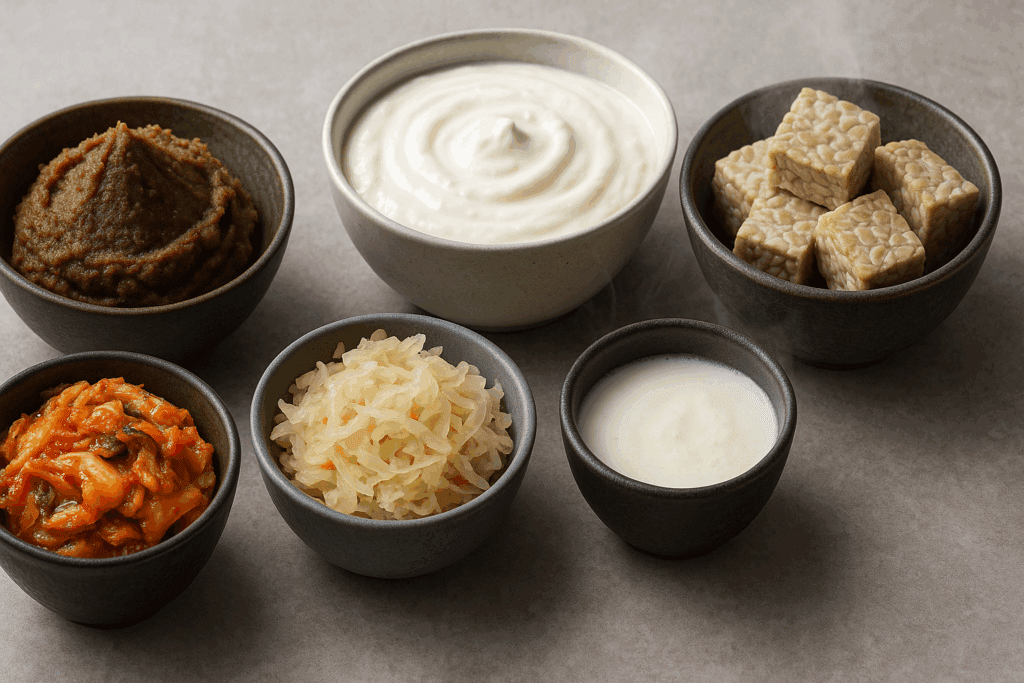
Fermented Foods and the Microbiome Connection
Fermented foods, including yogurt, kefir, kimchi, sauerkraut, miso, and tempeh, offer a dynamic way to support the gut microbiome and, by extension, overall health. These foods contain live microbial cultures that can enhance microbial diversity in the intestines, a factor increasingly linked to immune resilience, mood stability, and metabolic balance.
The consumption of fermented foods has been associated with reductions in markers of inflammation and improvements in digestive symptoms such as bloating and constipation. Additionally, certain strains of probiotics found in fermented products can modulate neurotransmitter levels, including serotonin and GABA, contributing to mental well-being. This connection reinforces the emerging concept that food for health includes not only nutrients but also microbial ecosystems.
Scientific studies suggest that regularly consuming fermented foods may reduce the risk of allergies, autoimmune diseases, and even anxiety disorders. Incorporating small, daily servings of these foods—preferably with live cultures—can be a valuable addition to a health-promoting diet. Importantly, variety matters; rotating different types of fermented foods helps diversify the microbial inputs and maximize the benefits.Nuts, Seeds, and Essential Fats
Nuts and seeds are compact sources of essential nutrients, including healthy fats, protein, fiber, vitamin E, magnesium, and plant sterols. Almonds, walnuts, flaxseeds, chia seeds, and sunflower seeds each offer unique compositions that support cardiovascular health, brain function, and cellular integrity. Regular consumption has been linked to reduced all-cause mortality and lower incidence of metabolic diseases.
For example, walnuts are rich in ALA, a plant-based omega-3 fatty acid that supports anti-inflammatory pathways and may reduce the risk of neurodegenerative diseases. Meanwhile, flaxseeds provide lignans that exhibit estrogen-modulating and anticancer properties. Chia seeds deliver a hydrophilic form of fiber that slows digestion and improves blood sugar regulation.
Clinical research supports the idea that small daily servings of nuts and seeds can reduce LDL cholesterol levels, improve endothelial function, and assist with weight management despite their calorie density. This paradox is explained in part by their satiety-inducing qualities and their positive effects on metabolic efficiency. For those looking to embrace the best nutrition for health, incorporating a mix of raw or dry-roasted nuts and seeds is a smart and satisfying strategy.

Herbs, Spices, and Phytochemical Powerhouses
Herbs and spices may be used in small amounts, but their impact on health is anything but minor. Many culinary herbs contain potent phytochemicals with antioxidant, anti-inflammatory, and antimicrobial properties. Turmeric, for example, is renowned for its curcumin content, a compound shown to inhibit NF-kB signaling and reduce markers of inflammation in clinical trials.
Ginger has been extensively studied for its anti-nausea, anti-inflammatory, and analgesic effects, making it a multifunctional agent in both traditional and modern medicine. Similarly, garlic offers cardiovascular benefits by improving nitric oxide availability, reducing blood pressure, and modulating lipid levels. These properties support its long-standing reputation as a food for health in diverse cultural traditions.
Incorporating a variety of herbs and spices into daily meals can elevate not only flavor but also the nutritional density of food. Their phytochemicals work synergistically with other nutrients to promote resilience against oxidative stress and chronic inflammation. As scientific interest in culinary medicine grows, these ancient food components are being re-evaluated as integral elements of modern nutrition science.
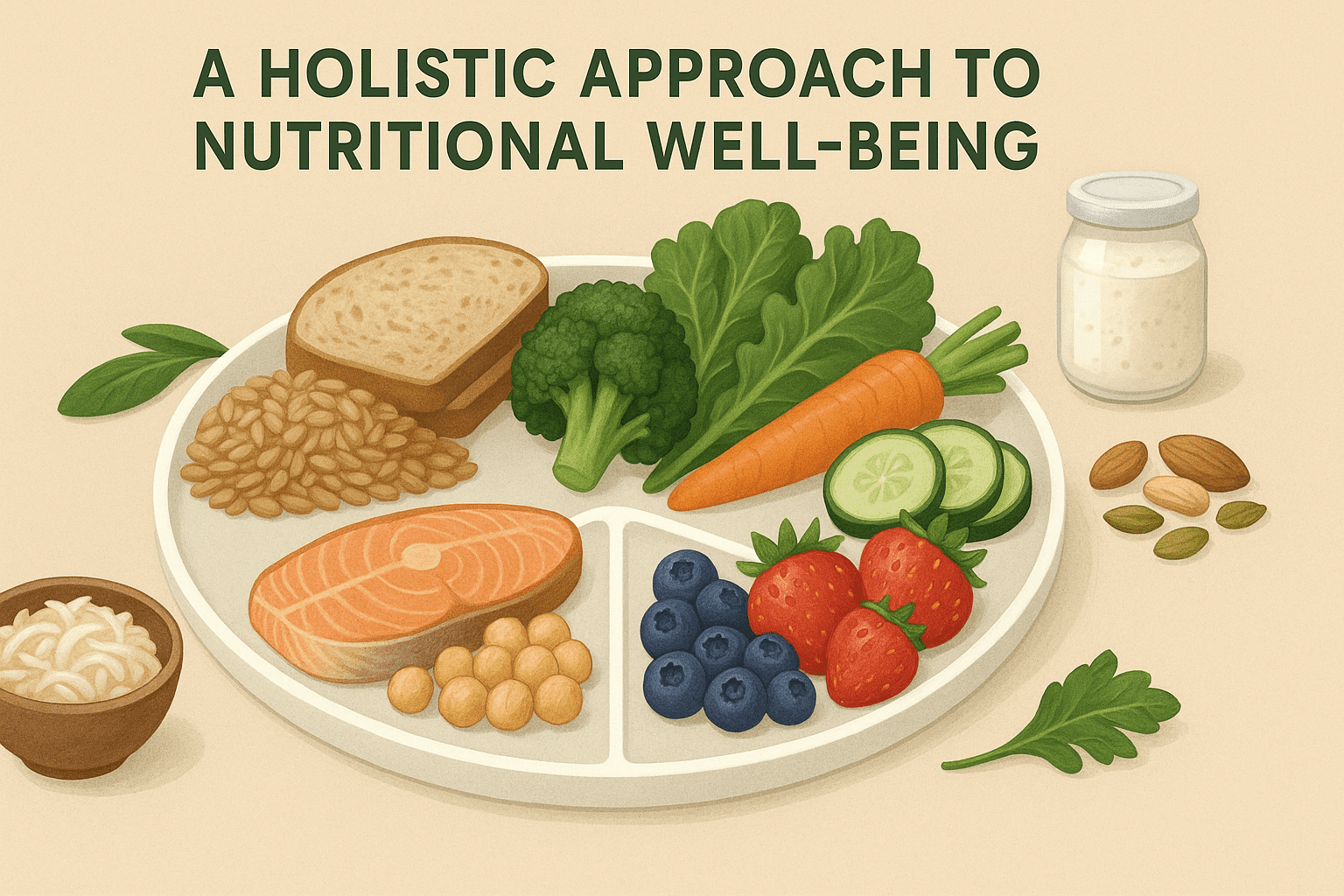
A Holistic Approach to Nutritional Well-Being
The best nutrition for health doesn’t reside in isolated superfoods or restrictive diet plans. Rather, it emerges from a thoughtful, consistent integration of scientifically validated food choices across multiple domains. From fiber-rich legumes and whole grains to omega-3-packed fish and fermented foods that nourish the gut, each category plays a complementary role in sustaining well-being.
This holistic approach also considers timing, preparation, and variety. Eating seasonally, choosing minimally processed options, and maintaining cultural culinary practices all contribute to the effectiveness and enjoyment of healthful eating. While supplements can fill gaps when necessary, they cannot replicate the complex matrix of nutrients and phytochemicals found in whole foods.
Ultimately, the goal is to cultivate a lifestyle in which the pursuit of food for health becomes second nature—an organic part of how we nourish ourselves, prevent illness, and support longevity. Rather than relying on fleeting trends, embracing evidence-based nutrition empowers individuals to make sustainable, impactful choices for lifelong vitality.
Frequently Asked Questions (FAQ)
- What are the key components of food for health, and how can they be incorporated into daily meals?
When considering food for health, it’s important to focus on nutrient-dense options that provide vitamins, minerals, protein, and fiber. Incorporating a variety of colorful fruits and vegetables into meals ensures that you get a wide array of essential nutrients. Whole grains like quinoa, brown rice, and oats offer sustained energy, while lean proteins such as chicken, fish, and plant-based options like lentils are crucial for muscle repair and immune function. To make these foods more enjoyable, try experimenting with different cooking methods, such as roasting vegetables or grilling lean proteins. Remember that the best nutrition doesn’t have to be complicated; simple, whole foods prepared with care can deliver all the nutrients your body needs.
- How does the concept of “best nutrition” vary from person to person?
The idea of “best nutrition” is highly individualized, as it depends on a person’s age, activity level, health conditions, and specific dietary needs. For some, a plant-based diet might be the best option for maintaining energy and health, while others may thrive on a more balanced diet that includes animal products. Moreover, the best nutrition is not a one-size-fits-all approach; it is about understanding what your body responds to best. For example, someone with lactose intolerance might opt for dairy-free alternatives, while another person may need higher levels of protein to support muscle mass. The key to finding the best nutrition is listening to your body and consulting with a healthcare provider or nutritionist to tailor a plan that works for you.
- Can the best nutrition improve mental clarity and cognitive function?
Absolutely! Food for health isn’t just about physical wellness—it also plays a crucial role in mental clarity and cognitive function. Certain nutrients, like omega-3 fatty acids found in fatty fish, have been shown to improve brain health and enhance cognitive performance. Similarly, antioxidants from fruits like blueberries, which combat oxidative stress, can contribute to a sharper mind. In addition, B vitamins found in whole grains and leafy greens are vital for energy production within the brain, supporting overall mental well-being. By consistently choosing the best nutrition, you are providing your brain with the essential nutrients it needs to function at its best.
- How can someone balance the need for nutrition with a busy lifestyle?
Balancing nutrition with a hectic schedule requires a bit of planning, but it’s completely achievable. One practical approach is meal prepping. Spend some time on weekends or in your free hours preparing meals that can be quickly reheated or eaten on the go. Preparing dishes that feature the best nutrition—like salads with lean protein or grain bowls with roasted vegetables—can ensure that your meals are both nourishing and convenient. Snack options like nuts, fruit, or yogurt are also easy to grab when time is tight. Having nutritious options readily available will help you avoid unhealthy, impulsive choices and keep your energy levels steady throughout the day.
- What role does hydration play in achieving the best nutrition?
Hydration is often an overlooked aspect of food for health, yet it is crucial for maintaining optimal bodily function. Water aids in digestion, nutrient absorption, and the transportation of essential vitamins and minerals. It also helps regulate body temperature and supports cognitive function. Many people forget to hydrate, especially in busy environments or during meals. To ensure you’re getting the best nutrition, try to drink water consistently throughout the day, aiming for at least 8 cups, and incorporate hydrating foods like cucumbers, watermelon, and celery into your meals. Proper hydration enhances the effects of the best nutrition, making it a vital component of overall wellness.
- Can food for health improve skin health and appearance?
Yes, the food you eat has a direct impact on the health and appearance of your skin. Nutrients like vitamin C, which is found in citrus fruits and leafy greens, are essential for collagen production, promoting skin elasticity and reducing signs of aging. Omega-3 fatty acids, present in foods like salmon and flaxseeds, help maintain skin hydration and reduce inflammation, which can prevent acne. Additionally, antioxidants like vitamin E, found in nuts and seeds, protect the skin from free radical damage caused by UV exposure and pollution. By focusing on the best nutrition, you can enhance the health of your skin from the inside out, leading to a radiant and youthful complexion.
- How does the best nutrition support immune health?
A diet rich in food for health provides the immune system with the nutrients it needs to function properly. Vitamins A, C, D, and zinc are critical for immune defense, and you can find them in foods such as sweet potatoes, citrus fruits, leafy greens, and nuts. Probiotics, found in fermented foods like yogurt and kefir, help maintain a healthy gut microbiome, which is closely linked to immune health. Moreover, protein is necessary for the production of antibodies that fight infections. Ensuring that your diet includes the best nutrition to support immune function can help prevent illness and promote overall well-being.
- Are there specific food groups that should be prioritized for optimal nutrition?
While the best nutrition comes from a variety of food groups, certain categories should be prioritized for optimal health. Whole grains like quinoa, oats, and barley provide fiber and important nutrients that support digestion and heart health. Leafy greens and cruciferous vegetables like spinach, kale, and broccoli should be staples due to their high vitamin, mineral, and antioxidant content. Additionally, lean proteins such as chicken, turkey, legumes, and fish are essential for muscle repair and immune function. Healthy fats, such as those found in avocados, olive oil, and nuts, support brain health and inflammation regulation. Together, these food groups create a balanced diet that offers the best nutrition for long-term health.
- How can one maintain the best nutrition while dining out?
Dining out doesn’t have to mean compromising your health goals. To maintain the best nutrition while eating at restaurants, start by choosing places that offer healthy options, such as those with a focus on fresh ingredients and balanced meals. Look for dishes that feature vegetables, lean proteins, and whole grains, and avoid fried foods or those laden with heavy sauces. Many restaurants now offer nutritional information, so use that to make informed choices. If you’re unsure about a dish, don’t hesitate to ask for modifications, like dressing on the side or grilling instead of frying. Eating out can still align with your nutrition goals as long as you remain mindful of your choices.
- How can I stay motivated to choose the best nutrition consistently?
Staying motivated to make the best nutrition choices every day can be challenging, but small changes and consistent habits can help you stay on track. Start by setting realistic goals, like incorporating more fruits and vegetables into your meals or trying new healthy recipes each week. Consider keeping a food journal to track your meals and reflect on how your body feels after eating nourishing foods. Surround yourself with supportive people who prioritize food for health, as they can encourage and inspire you. Lastly, remember that food is not just about fueling your body—it’s about enjoyment too. By finding healthy foods you love, eating becomes a sustainable, fulfilling part of your lifestyle.
Conclusion: Embracing Evidence-Based Nutrition for a Healthier Future
As scientific understanding continues to evolve, one principle remains clear: the best nutrition for health is built on the foundation of real, whole, nutrient-rich foods. Rather than subscribing to rigid dietary ideologies or marketing-driven food fads, individuals can achieve meaningful improvements in well-being by focusing on foods that are supported by robust clinical and epidemiological evidence.
Prioritizing food for health means choosing ingredients that support optimal function across every body system. It means celebrating the diversity of nature’s pharmacy—from the anti-inflammatory power of berries and omega-3-rich fish to the gut-healing benefits of fermented foods and the metabolic strength of legumes. Each meal becomes an opportunity to reinforce resilience, improve mood, sharpen cognition, and reduce long-term health risks.
By shifting our focus from calorie counting to nutrient quality, and from short-term fixes to sustainable nourishment, we align ourselves with a deeper, more compassionate form of health care: one that begins at the end of our fork. In doing so, we reclaim agency over our wellness and invest in a future where vitality, clarity, and strength are not exceptions, but the norm.
food as medicine, polyphenol-rich foods, omega-3 benefits, dietary fiber sources, microbiome-friendly diet, anti-inflammatory nutrition, cardiovascular health foods, plant-based protein, fermented food health benefits, glycemic control strategies, antioxidant-rich diet, phytochemicals in herbs, longevity diets, whole food nutrition, heart-healthy eating, brain-supportive nutrients, sustainable diet choices, culinary medicine, gut-brain connection, science-backed superfoods
Further Reading:
Eat It or Leave It? A Comprehensive Ingredient Dictionary to Simplify Your Shopping Trip
Disclaimer: The content published on Better Nutrition News (https://betternutritionnews.com) is for informational and educational purposes only. It is not intended as a substitute for professional medical advice, diagnosis, or treatment. Always seek the guidance of a qualified healthcare professional before making any changes to your diet, nutrition, or wellness practices. The opinions expressed by authors and contributors are their own and do not necessarily reflect those of Better Nutrition News.
Better Nutrition News and its affiliates make no representations or warranties regarding the accuracy, completeness, or reliability of the information provided. We disclaim all liability for any loss, injury, or damage resulting from the use or reliance on the content published on this site. External links are provided for reference purposes only and do not imply endorsement.


